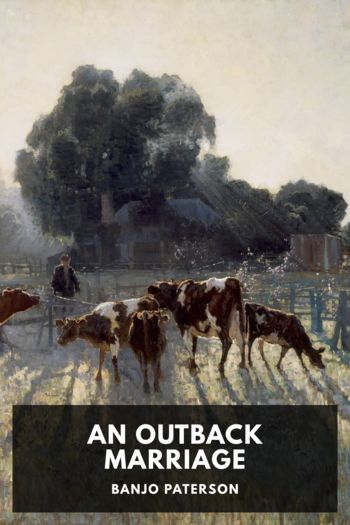An Outback Marriage - Banjo Paterson (epub e reader txt) 📗

- Author: Banjo Paterson
Book online «An Outback Marriage - Banjo Paterson (epub e reader txt) 📗». Author Banjo Paterson
Kuryong was a hill-country station of about sixty thousand acres all told; but they were good acres, as no one knew better than old Bully Grant, the owner, of whose history and disposition we heard something from Pinnock at the club. It was a highly improved place, with a fine homestead—thanks to Bully Grant’s money, for in the old days it had been a very different sort of place—and its history is typical of the history of hundreds of others.
When Andrew Gordon first bought it, it was held under lease from the Crown, and there were no improvements to speak of. The station homestead, so lovingly descanted upon in the advertisement, consisted of a two-roomed slab hut; the woolshed, where the sheep were shorn, was made of gumtree trunks roofed with bark. The wool went down to Sydney, and station supplies came back, in huge wagons drawn by eighteen or twenty bullocks, that travelled nine miles a day on a journey of three hundred miles. There were no neighbours except at the township of Kiley’s Crossing, which consisted of two public-houses and a store. It was a rough life for the young squatter, and evidently he found it lonely; for on a visit to Sydney he fell in love with and married a dainty girl of French descent. Refined, well-educated, and fragile-looking, she seemed about the last person in the world to take out to a slab-hut homestead as a squatter’s wife. But there is an old saying that blood will tell; and with all the courage of her Huguenot ancestry she faced the roughness and discomforts of bush life. On her arrival at the station the old two-roomed hut was plastered and whitewashed, additional rooms were built, and quite a neat little home was the result. Seasons were good, and the young squatter might have gone on shearing sheep and selling fat stock till the end of his life but for the advent of free selection in 1861.
In that year the Legislature threw open all leasehold lands to the public for purchase on easy terms and conditions. The idea was to settle an industrious peasantry on lands hitherto leased in large blocks to the squatters. This brought down a flood of settlement on Kuryong. At the top end of the station there was a chain of mountains, and the country was rugged and patchy—rich valleys alternating with ragged hills. Here and there about the run were little patches of specially good land, which were soon snapped up. The pioneers of these small settlers were old Morgan Donohoe and his wife, who had built the hotel at Kiley’s Crossing; and, on their reports, all their friends and relatives, as they came out of the “ould country,” worked their way to Kuryong, and built little bits of slab and bark homesteads in among the mountains. The rougher the country, the better they liked it. They were a horse-thieving, sheep-stealing breed, and the talents which had made them poachers in the old country soon made them champion bushmen in their new surroundings. The leader of these mountain settlers was one Doyle, a gigantic Irishman, who had got a grant of a few hundred acres in the mountains, and had taken to himself a Scotch wife from among the free immigrants. The story ran that he was too busy to go to town, but asked a friend to go and pick a wife for him, “a fine shtrappin’ woman, wid a good brisket on her.”
The Doyles were large, slow, heavy men, with an instinct for the management of cattle; they were easily distinguished from the Donohoes, who were little red-whiskered men, enterprising and quick-witted, and ready to do anything in the world for a good horse. Other strangers and outlanders came to settle in the district, but from the original settlement up to the date of our story the two great families of the Doyles and the Donohoes governed the neighbourhood, and the headquarters of the clans was at Donohoe’s “Shamrock Hotel,” at Kiley’s Crossing. Here they used to rendezvous when they went away down to the plains country each year for the shearing; for they added to their resources by travelling about the country shearing, droving, fencing, tanksinking, or doing any other job that offered itself, but always returned to their mountain fastnesses ready for any bit of work “on the cross” (i.e., unlawful) that might turn up. When times got hard they had a handy knack of finding horses that nobody had lost, shearing sheep they did not own, and branding and selling other people’s calves.
When they stole stock, they moved them on through the mountains as quickly as possible, always having a brother or uncle, or a cousin—Terry or Timothy or Martin or Patsy—who had a holding “beyant.” By these means they could shift stolen stock across the great range, and dispose of them among the peaceable folk who dwelt in the good country on the other side, whose stock they stole in return. Many a good horse and fat beast had made the stealthy mountain journey, lying hidden in gaps and gullies when pursuit grew hot, and being moved on as things quieted down.
Another striking feature was the way in





Comments (0)